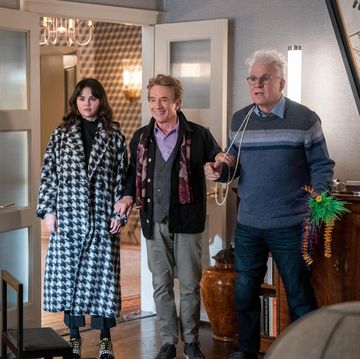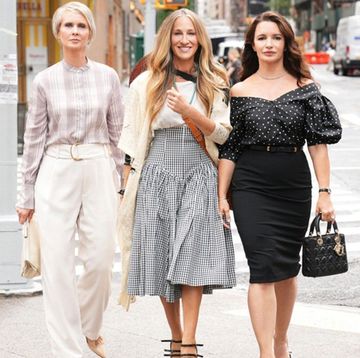Maternal age is a thorny issue. Unquestionably, women shouldn't be pressured into having children before they feel best equipped to rear them.
And with the average age of first births being 30.3 in England and Wales currently - according to the Office of National Statistics - it would appear that women are reaching 'parenting confidence' later and later.
Careers, education, better contraception and also finally being bestowed with the faculty to make confident and self-interested decisions about our own bodies are all responsible for this trend.
Unfortunately, and though the term 'biological clock' seems borderline offensive these days, the other unquestionable truth about women's fertility is that it decreases with age.
And not just by a little bit either.
The Royal College of Obstetricians and Gynaecologists (RCOG) website explains that the healthiest age to have your babies is between 20 and 35. And though this won't come as a surprise to most people, what you might not know is that after 35, women's fertility doesn't just gradually decline. It sort of drops off a cliff.
Let's put it this way, the RCOG states that the live birth rate for women under 35-years-old, who are undergoing IVF treatments, is 31 per cent. But, for women of 42-years-old and over, this rate falls below just 5 per cent.
To rephrase that slightly: after 42, if you need help conceiving - which many, many women of that age will - even with IVF treatment, you have less than 5 per cent chance of carrying to term and birthing a healthy, living baby.
Our bodies are, arguably, so badly designed for carrying babies later in life, that the NHS has to treat 'later pregnancy maternal health' completely differently. And as more and more of us fall into the 'later pregnancy' category, the RCOG have even labelled it, rather unflatteringly, an 'emerging public health issue.'
It's a rotten thing to have to consider, that while we're just women here trying to 'have it all,' our bodies are ill rigged to deliver on that promise.
It becomes imperative then, that if we're going to exercise our right to put our careers first while we're still in our 20s and push back having children until such a time as we feel appropriate, we also have to arm ourselves with as much knowledge about fertility, in general, and our own bodies, as possible.
Ploughing on and hoping for the best is okay, but only if you're prepared to accept whatever hand you eventually get dealt.
If having children is essential to you, you'd be best advised to have a plan.
Getting Fertility Tested Early
Happily, though, the number of ways that women can keep track of their own reproductive health is increasing. From basic management of menstrual rhythms via apps like Natural Cycles, through to a complete fertility MOT, your options are broad.
If you're in the market for a thorough understanding of your own fertility, there are several distinct sorts of services you can choose from and none of them require you to have been trying for a baby before you sign up.
Below, we've delved into two different options.
Face To Face With An Expert
Sometimes, and especially when dealing with something so sensitive, you just want to be sat in front of an expert, with enough time to ask all the questions that have kept you awake at night.
And this is increasingly on offer, with more and more fertility clinics providing services to younger women who haven't yet begun trying and don't plan to for a few years.
Where to go: The Lister Fertility Clinic in London, for example, part of HCA UK, have launched a ‘Fit for Fertility’ service, which promises to test your AMH levels (the hormone responsible for conception) and your follicle count (the number of egg producing follicles in your ovaries) and then sit you with a consultant gynaecologist to talk through the results and your options.
What does it involve? It involves heading to the clinic for a blood test, answering a fairly detailed questionnaire about your medical history and your lifestyle, including nutrition and exercise, and then returning to the clinic just over a week later to talk through their summary of your reproductive health with a doctor.
Why is this for you? Whether it's good news, bad news or, more often than not, news that's a complicated picture, it feels incredibly reassuring to be sat in front of an expert.
The doctor can tell you whether you are likely to find conception and pregnancy easy or hard and what age might be your personal cut off point for trying to have children.
They can offer you meaningful lifestyle advice for improving your fertility and, better yet, they can help you plan ahead for the future with a bit of human compassion and deal with the many emotions that might go had in hand with difficult test results.
It's hard to place a value on the benefit of someone who has literally seen it all before, speaking to you calmly and kindly.
If you're interested in booking a 'Fit for Fertility' assessment, the cost for the complete service, including consultation, starts at £495. Read more here or call them on +44 (0) 207 881 2000.
Get It All In A Personalised App
Sometimes, especially if you're still young and you're not sure what questions to ask, heading in to see a consultant can feel daunting.
For others, the thought of trying to book a double appointment during busy working weeks, is too much of a faff.
If this sounds like you, there's another option which might better suit your needs.
Where to go: LiveSmart is a healthcare company that intends to help you make healthier choices for yourself, by finding out exactly what's going on inside your body and giving you expert advice about what to do differently.
While the brand do a line in complete health MOTs, they have a special focus in Pre-Pregnancy health. Their 'Prepare Plans' offer an exhaustive health check up and fertility advice from a range of experts. Better yet, your results are delivered to you within a personalised web portal which you can look at any time, even on the go.
What does it involve? While mostly the packages are engineered to work for busy people who can't leave work to attend a clinic appointment, you are still required to do a blood test. They wouldn't be able to assess your hormone levels without one.
However, to make this as convenient as possible for you, the blood testing kit arrives to your home in the post and LiveSmart arranges for a locum nurse to pop over and take the test whenever you've got a free moment. This could even be first thing on a Saturday morning, before breakfast, if that's what works with your schedule.
Once the tests have been taken and sent off, and you've completed their lifestyle questionnaires, a number of days later you'll be sent an access code and a web link to your online portal, in which you can see a complete set of results, with advice for improving any of the things that aren't ideal.
Why is this for you? The results pages in your web portal are about as comprehensive as they come. You'll be able, not just to see what your AMH levels or your bilirubin levels are, for example, but you'll be able to see on a graph exactly where they sit within the recommended levels for someone of your age.
It's relatively self explanatory, easy to use and it's interactive. If you click on any of your test results, you'll also have access to advice from an expert about that specific aspect of your body.
It's as intrusive in your life as you want it to be, depending on what you sign up for. If you just want a quick overview and then to get on with your life, the five minutes you spend with the locum nurse might be the only contact time you ever have with someone else on the issue.
If you want help that's a bit more 'hands on', you can elect to have regular follow up sessions with a dietician.
If the results are very concerning for you though, you still may end up booking a face to face appointment with a doctor.
LiveSmart's healthcare testing packages start at £159, but the minimum for an assessment that includes fertility would be £299. For £499, you also get access to 6 months of in-depth coaching calls with a registered dietician. For more information, click here.

Natasha Bird is the Former Executive Editor (Digital) of ELLE.


















